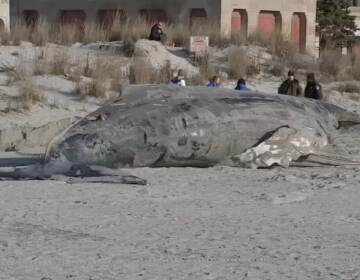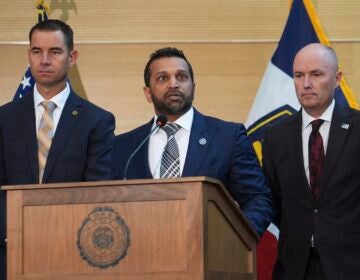Homicide rate drops 43% in New Jersey’s capital city during 2022
Twenty-three homicides were reported in Trenton during 2022, a significant drop following two straight record years. The mayor says more needs to be done to reduce violence.

The state Capitol building in Trenton, New Jersey. (Evelyn Tu for WHYY)
New Jersey’s capital city experienced a steep drop in its homicide rate.
There were 23 homicides in Trenton during 2022, according to the Mercer County Prosecutor’s Office. That is a 43% decrease, compared to the last couple of years.
Mayor Reed Gusciora credits a number of things to the reduce in bloodshed, including hiring more police officers, the launch of a team of residents tasked with mediating neighborhood disputes before they turn violent, as well as, the opening of the city’s real-time crime center, and a before and after school center for at-risk youth.
“We’ve done … all of the above to try to stem the violence in the city,” Gusciora said. “And, by and large, a lot of that has paid off.”
Homicides across the country have gone down by 5%, according to research by AH Datalytics. Wilmington, Del. saw a 57% drop in homicides, while Newark, N.J. saw homicides decrease by 15% and Philadelphia’s homicide rate slipped 9%.
The city broke the homicide record in 2020 and tied it in 2021. Gusciora said a combination of factors caused murder rate to spike during those years.
“I think the large number was due to the pandemic and issues of people staying at home, people out of work; just the whole tension of the times,” he said.
Twelve people were murdered in Trenton through the first half of 2022 before a peace in the streets took place in the summer. No homicides were recorded between June and August. The non-violent streak ended in September with the shooting death of a man.
Other crime reduction highlights that Husciora touted include a 27% reduction in burglaries, a 23% decrease in sexual assaults, and 354 firearms recovered.
But there was a 7% increase in aggravated assaults.
Overall, the mayor says more than police work is needed to reduce violence.
“We’re going to have to have better education outlets and outcomes, and we’re going to have to have more of those discussions with street teams and to give and provide jobs to a lot of the youth,” said Gusciora. “If they have a job, they don’t have time to spend out on the streets.”
WHYY is your source for fact-based, in-depth journalism and information. As a nonprofit organization, we rely on financial support from readers like you. Please give today.







